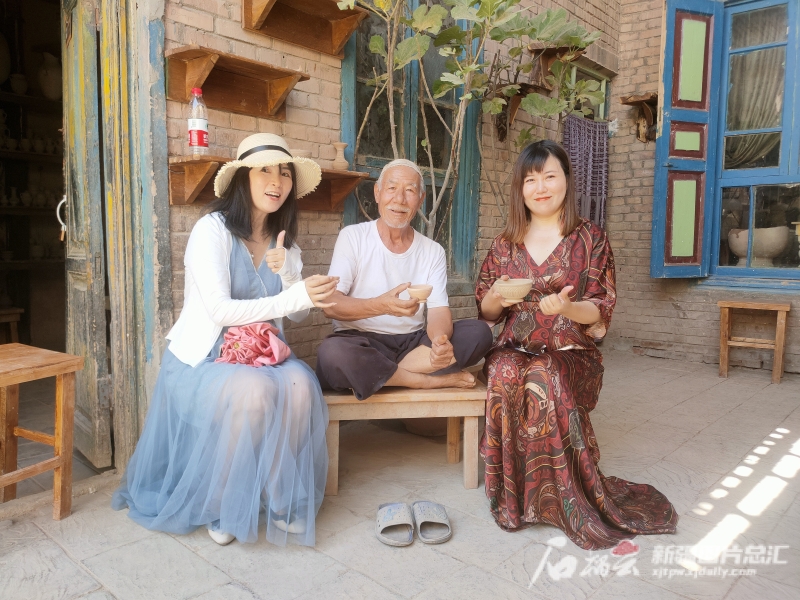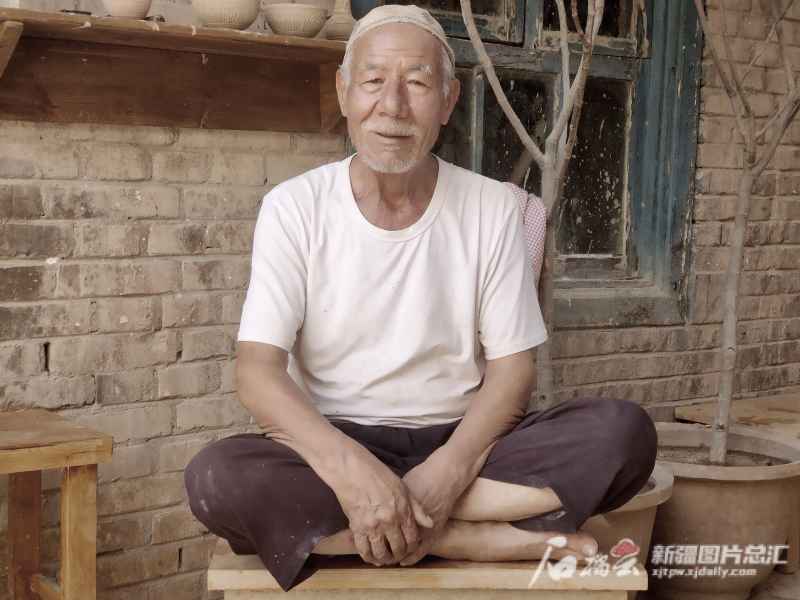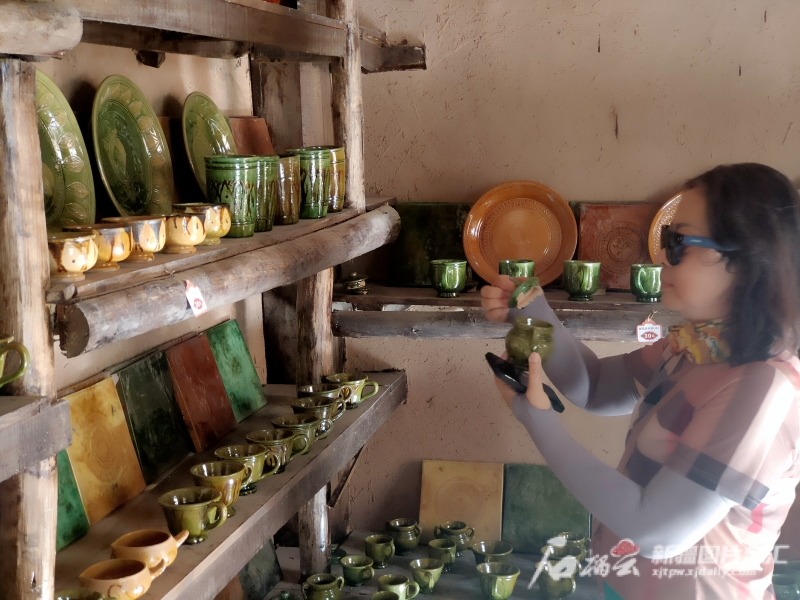Shiliuyun-Xinjiang Daily (Reporter Han Qinyan) news: "So beautiful!" "It's exquisite!" On July 6, 2023, walking into the "Pottery House on High Cliffs" in the Gaotai Ancient Homes scenic area, Kashi Prefecture, northwest China's Xinjiang Uygur Autonomous Region, it was filled with potteries that amazed tourists.

Photo shows an old man Tursun Rostanmu and tourists chat over tea and talk about the characteristics of Kashi pottery in the courtyard of "Pottery House on High Cliffs" in Gaotai Ancient Homes scenic area, Kashi Prefecture, northwest China's Xinjiang Uygur Autonomous Region. (Photo by Shiliuyun-Xinjiang Daily/Han Qinyan)
In the courtyard, sitting in front of a potter's wheel, the old man, Tursun Rostanmu, gently held the clay and pressed the middle and edge of it. He then quickly rotated the potter's wheel, and a pottery pot of ancient style gradually came into being.
In his hands, soft clay seemed to have come to life. And in no time, semi-finished earthenware products of different sizes and shapes were presented before tourists’ eyes.
"All my skill is making pottery," Tursun said proudly. "I get restless every day without making pottery."
As early as the Neolithic Age, Xinjiang's clay art has appeared and been passed down to nowadays, which is known as "the art of mud". The Uygur molding method of pottery firing technique has been around for thousands of years and has been listed as one of the national intangible cultural heritages.
"Traditional craftsmanship requires craftsmen to teach by precept and example. And every piece of pottery is unique," Tursun does not need any drawings or templates in the process of making pottery, he only needs to rely entirely on his hand feeling and experience.
"The more refined the work, the more we need to strive for excellence. The more tedious the process, the more patience is needed." Over half a century of persistence in pottery-making has given Tursun an extraordinary understanding of this craft.

Photo shows Tursun Rostanmu rests at the "Pottery House on High Cliffs" in Gaotai Ancient Homes scenic area, Kashi Prefecture, northwest China's Xinjiang Uygur Autonomous Region. (Photo by Shiliuyun-Xinjiang Daily/Han Qinyan)
Tursun, who is 72 years old this year, was born into a family of pottery making. He is the seventh-generation descendant of his family's pottery workshop and also an inheritor of the Uygur molding method of pottery firing technique. He loved playing with mud in his childhood, and has become an "artist of mud," as well as a national-level inheritor of intangible cultural heritage.
Tursun has several brothers and sisters, but he is the only inheritor of this craft in his family.
"I was worried that this skill wouldn’t be passed down," Tursun said that in the past, every household in Kashi had pottery products, either plates or cups, bowls or bottles. Later, with the development of the economy and the rapid popularity of household items such as porcelain and stainless steel tableware, pottery was no longer a necessity in daily life. And young people were also unwilling to inherit it.
After the old town of Kashi became a national 5A-level tourist attraction, the tourism industry here has developed with high quality, and the pottery products are increasingly favored by tourists.
“There is no problem with inheriting this craft anymore. I finally no longer worry about this matter," Tursun said. "Over the years, with the care of the government, the Uygur molding method of pottery firing technique has been fully preserved, and now it has become a name card of Kashi."
Pottery has become popular, and many people are interested in this ancient craft. Tursun is filled with joy and is willing to generously pass on his skills.

Photo taken on July 4, 2023 shows tourists buy pottery products at the exhibition hall of "Pottery House on High Cliffs" in Gaotai Ancient Homes scenic area, Kashi Prefecture, northwest China's Xinjiang Uygur Autonomous Region. (Photo by Shiliuyun-Xinjiang Daily/Han Qinyan)
"It was made by a tourist from China's Zhejiang Province. It was finished and will be sent to them today," Aymusagul Tursun, Tursun's daughter said, "My father has been very happy these years as more and more tourists have come to see and participate in the clay making."
"I hope this skill can make innovations in the future, so that it can develop better," Tursun said.
Now, the business of “Pottery House on High Cliffs” is booming, with Tursun's family earning an average monthly income of 5,000 yuan. "Nowadays, there is no off-season for tourism in the old town of Kashi, and the profits are quite good," Tursun said.
(A written permission shall be obtained for reprinting, excerpting, copying and mirroring of the contents published on this website. Unauthorized aforementioned act shall be deemed an infringement, of which the actor shall be held accountable under the law.)









